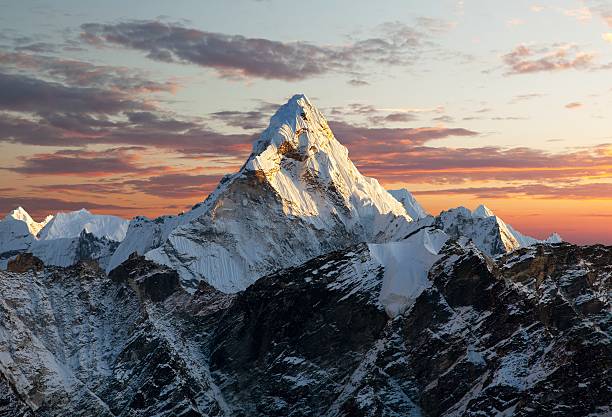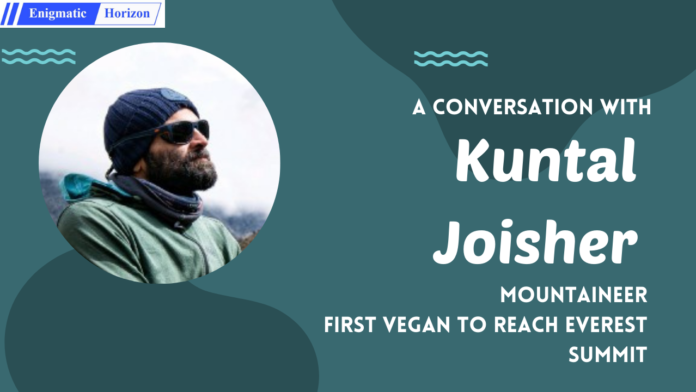Edited by – Robin Bhuyan (Editor-in-Chief)
Written by – Reetika Choudhury
Interviewed by – Shashi Salwani
Join us in an exciting conversation with Kuntal Joisher, the first vegan in known history to have reached the Everest summit, not once but twice! He has also scaled several other mountains, including North America’s and South America’s highest peaks, proving that a vegan diet is effective and is no barrier for anyone who wants to reach the peak of their physical capabilities! In addition to being a mountaineer, Kuntal is also a fitness trainer and coach. In this chat with Enigmatic Horizon, he talks about his journey, his inspiration, myths regarding veganism, as well as about the existence of the Yeti!
What drove your interest into the mountaineering world?
My journey into the world of mountaineering began unexpectedly, while I was occupied in a career as a software engineer. I was working for a Los Angeles-based company. Life seemed smooth, until a vacation trip led me and my wife to the snowy heights of Shimla in February 2009. Despite days of anticipation, the snow eluded us, but I was firm that I wanted to experience it! Since I had not experienced it for years, if not decades! Soon, we had a chance encounter with a driver who promised to give us this experience and he took us on an unforgettable journey to Narkanda. Amidst the majestic Himalayas, we found ourselves on our way to Hatu Mata Temple, our hearts racing with excitement. As the car stalled in the snow, my wife and I embraced the moment, reveling in the pure joy of the snowy wilderness. Our journey to the Hatu Mata Temple became one of the most soul-stirring experience in my life! Returning to Mumbai, I found myself yearning for that same feeling in my professional life. I found that mountains were my calling, and so I embarked on treks, each summit reigniting my passion for adventure. One fateful day, I made the decision to journey to the Everest base camp. The golden hues of sunset illuminating Everest from its base camp were magnificent and left a mark on my soul. In that moment, I fell in love with the mountain, promising myself to conquer its summit one day. And this is how it all began – my journey into the world of mountaineering!
How did you get the inspiration to become a vegan?
I am from a Gujarati vegetarian family, and during my childhood, I had a conversation with my mother about the ethics of food consumption. She explained how animals, like us, felt emotions, and it was never justified to take their life for food. However, during my time in the US, I found myself drawn to desserts and products made from animal by-products. It wasn’t until a roommate questioned my choices and shed light on the cruelty of the egg and leather industries that I began to reevaluate my lifestyle. Slowly, I began learning about the harsh realities of the dairy and egg productions, and this opened my eyes to the suffering of animals. I realized that my actions were not aligning with my values, and I made the decision to transition to a vegan lifestyle. Now, 22 years later, I reflect on my journey with gratitude, but also with a sense of regret for not making the switch sooner. Every day, I’m grateful for the opportunity to live in alignment with my beliefs and for being able to make compassionate choices for animals, the world, and myself. 
Many claim that animal fat and protein is necessary to become fit and strong. How do you counter such claims?
When I decided to journey towards Everest, many felt that I wouldn’t be able to do it, on a vegan diet. Many argued that animal protein was essential for strength and endurance, especially during long treks. Despite the doubts, armed with eight years of knowledge about plant-based nutrition, I resolved to prove them all wrong! After a year of rigorous training and refining my diet, I embarked on my first expedition to Stok Kangri in Ladakh in July 2011. Standing at 20,187 ft, I faced no difficulties as a vegan, and this helped boost my confidence. Over the past 15 years, I’ve completed over 35 Himalayan expeditions, including two successful treks to Everest. I have conquered Africa’s tallest peak and have also reached South America’s and North America’s highest summits. My performance on these treks rivaled that of non-vegan climbers, dispelling the myth that vegan diets lack sufficient protein for athletic needs. As I stood atop Everest for the second time in 2019, there was a feeling of joy as well as peace, knowing that no animal had suffered for my achievements to succeed. 
From Mike Tyson to Virat Kohli, in the last 10 years, many sportspersons turned themselves vegan- what do you think is the reason behind it?
Not sure about Virat Kohli or Mike Tyson, but yes, in recent years, numerous elite athletes, from Novak Djokovic to Lewis Hamilton, have embraced plant-based diets or even full vegan lifestyles. While Virat Kohli may not be strictly vegan, his avoidance of meat reflects a growing trend among athletes toward plant-based eating. If we talk about the reasons, firstly, plant-based foods are rich in antioxidants, which aid in recovery and promote overall health. Additionally, consuming plant-based foods tends to leave athletes feeling lighter and more energized, as their digestive systems operate more efficiently. Moreover, many are concerned about climate change and animal welfare issues, which have also played a role in athletes’ decisions to adopt plant-based diets. By choosing plant-based options, athletes align their dietary choices with their ethical and environmental values, contributing to a more sustainable and compassionate lifestyle. Ultimately, the increasing popularity of plant-based diets among athletes shows us its numerous benefits, both for individual health as well as for the environment!
Is there any role model of yours among the vegan athletes and mountaineering?
Lewis Hamilton, an eight-time World Racing Champion, and Scott Jurek, renowned for setting the fastest known time running record, are some of the people who always inspire me. Through their remarkable achievements as vegans, we can clearly see the extraordinary potential that plant-based diets have. In the realm of mountaineering, Ed Viesturs is one of my inspirations. He became the first American mountaineer to conquer all 14 8000-meter mountain peaks without supplemental oxygen. His book, “No Shortcuts to the Top,” serves as a beacon of motivation, inspiring me on my own journey.
Other than the feeling of happiness, how did you feel when you reached the Everest peak? Was there a sense of anxiety?
Happiness was there, but the biggest feeling was tiredness! Just before I was about to reach the peak, exhaustion weighed heavily upon me, and the journey started feeling more like a desperate bid for survival. However, as the summit came into view, a surge of adrenaline coursed through my veins, and I decided to move forward with determination. Despite the physical and mental strain, my focus remained unwavering—I had to reach the top, but above all, I had to return alive in one piece! In that moment, every thought was centered on ensuring my own preservation, so I knew I had to proceed with caution and care.
Apart from this, what other notable achievements do you have?
Following my conquest of Everest, my mountaineering pursuits led me to scale the towering peaks of South America’s Aconcagua and North America’s Denali. Over the past two to three years, these formidable summits have tested my endurance and resolve, and can be counted as my best mountaineering achievements.
Did you have any supernatural experience during your journey? Do you think Yeti exists?
See, I am someone who is grounded in a scientific mindset, and therefore I prioritize facts and evidence over speculative beliefs. So when it comes to the existence of the Yeti, I remain skeptical, and I feel it might be a product of human imagination. However, this is just my opinion, not to be taken as fact! In my view, supernatural experiences that people have on expeditions are most likely manifestations of oxygen deprivation-induced hallucinations. I don’t really feel people have actually encountered mythical beings like the Yeti.
What advice do you want to give to the newcomers in the field of mountaineering?
Dedicate the bulk of your time to training—begin by honing your physical fitness, then focus on mountaineering skills before venturing into expeditions! Start by climbing mountains ranging from 18,000 to 20,000 feet, gradually gaining experience and expertise. Avoid shortcuts! You will become not just a skilled mountaineer but also a person of integrity and character along the way!
Keep following Enigmatic Horizon for more of such amazing content.
If you are into gaming and the world of virtual reality, check out these five health tips for VR gaming, if you ever try it out.
